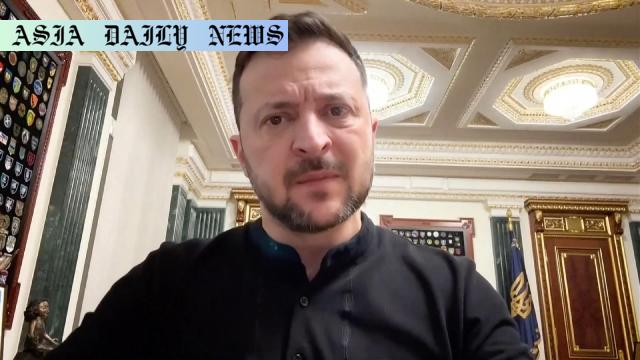Manipulation: Zelenskyy accuses Putin of trying to manipulate Trump while 90,019 Russian military deaths since 2022 conflict surfaces.
Zelenskyy accuses Putin of attempting to manipulate Trump’s peace aspirations.
Mediazona and the BBC verify 90,019 Russian military deaths since the Ukraine invasion began.
A significant portion of the deceased originated from rural areas or populations under 100,000.

Zelenskyy Accuses Putin of Manipulation
The Ukrainian President, Volodymyr Zelenskyy, recently voiced significant allegations against Russian President Vladimir Putin, claiming an attempt to exploit U.S. President Donald Trump’s peace overtures for Russia’s strategic gains. This came after Putin expressed his willingness to meet with Trump. In contrast, Trump had earlier shared his hopes of engaging with Putin to discuss peace prospects. According to Zelenskyy, newly surfaced Ukrainian intelligence indicates that Russia remains committed to prolonging the ongoing conflict. The Ukrainian leader underscored his belief that Putin hopes to “manipulate” Trump’s desires towards a peaceful resolution, thus leveraging it for Russia’s advantage on the global stage.
Statistics Painting a Grim Picture
Further adding to the international discourse surrounding Russia’s engagement in Ukraine, a joint report by Mediazona and BBC confirmed a striking revelation. As of their latest compilation, 90,019 Russian military personnel have been killed since the invasion commenced in February 2022. This data, pulled from family social media posts and local reports, underscores the sheer loss of human life amidst the conflict. However, the report also cautioned that the actual numbers could be even higher. This disparity highlights the challenges faced when accessing accurate statistics in wartime conditions.
The Human Cost of Conflict
The demographic analysis provided by the report offers unique insights into the nature of the casualties. Surprisingly, 23 percent of the deceased had joined the military after the invasion, signifying an uptick in emergency recruitments. Another considerable chunk, 17 percent, consisted of prisoners offered frontline roles in exchange for their release. A further 12 percent were newly mobilized forces, hastily drafted and deployed. The regional composition of the casualties further reflects Russia’s societal divisions, as a majority—around 80 percent—came from rural regions or smaller towns with populations fewer than 100,000. This raises questions about the disproportionate impact the war has had on various social strata.
Global Implications of an Escalating War
In light of Zelenskyy’s allegations and the human cost revealed, the geopolitical consequences of the conflict continue to evolve. Should Putin manage to influence figures such as Trump, this could modify global approaches toward resolving the crisis. Instead of seeking lasting solutions to end aggression, there remains a risk of policies beneficial only to Russia potentially emerging on the global platform. At the same time, nations and allies backing Ukraine must carefully navigate these developments to avoid any adverse shifts in the international response mechanism to Russia’s actions.
Call for Transparency in Conflict Reporting
The joint Mediazona-BBC report also throws light on the importance of independent journalism amidst state-dominated narratives. By compiling death tolls from open-source avenues, journalists have provided a transparent lens to view the tragic ramifications of the war. This transparency further strengthens global advocacy for ending the hostilities, ensuring accountability remains central to addressing perpetrators of war crimes while supporting victims’ narratives.
A Lingering Question of Peace and Accountability
The emerging details highlight a larger challenge—achieving peace while ensuring accountability. Putin’s alleged manipulative intent, coupled with Russia’s mounting losses, indicates that this war has far-reaching effects domestically and globally. As nations navigate these intricacies, the pressing question remains: who will bear the burden of accountability amidst calls for peace? Only time will reveal whether transparency and diplomacy will prevail over manipulation and aggression.
Commentary
Analyzing the Allegations of Manipulation
The assertion by Ukrainian President Volodymyr Zelenskyy that Vladimir Putin seeks to “manipulate” Donald Trump exemplifies the delicate tightrope of global politics. Whether genuine or speculative, it highlights an underlying tension regarding how geopolitical leaders attempt to influence or leverage the sentiments of their counterparts. This alleged manipulation, if true, poses significant challenges not just to U.S. international relations but also to the broader international order seeking stability and peace amidst years of conflict.
The Sobering Reality of the Death Toll
The report indicating over 90,000 Russian military deaths since 2022 provides a stark reminder of the human cost of prolonged conflicts. The demographics reveal troubling patterns of rural communities bearing the brunt of Russia’s military losses. Such insights cast a somber light on how wars disproportionately affect underrepresented groups even within aggressor nations. The fact that prisoners and hastily mobilized forces constitute significant portions of the casualties further illustrates a desperate attempt by Moscow to sustain its military campaigns.
Reflection on the Path Forward
While the numbers and allegations paint a grim picture, the global community must focus on establishing pathways toward a sustainable resolution to the conflict. For leaders like Trump, whether Putin’s alleged manipulation succeeds will depend on their ability to discern genuine peace efforts from political ploys. Moreover, transparency through media like Mediazona and the BBC remains pivotal in pushing for accountability amidst disinformation campaigns. Ultimately, the world must prioritize an approach that both resolves the conflict and ensures dignity and justice for its victims.


